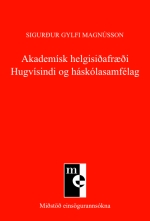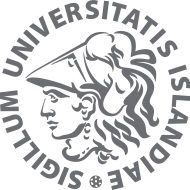 Academic Liturgy. Humanities and the Society of Scholars. Published by the Center for Microhistorical Research, 2007. 337 pages. – (Akademísk helgisiðafræði. Hugvísindi og háskólasamfélag (Reykjavík: Miðstöð einsögurannsókna, 2007)).
Academic Liturgy. Humanities and the Society of Scholars. Published by the Center for Microhistorical Research, 2007. 337 pages. – (Akademísk helgisiðafræði. Hugvísindi og háskólasamfélag (Reykjavík: Miðstöð einsögurannsókna, 2007)).
Over the last years I have taken a lively interest in analyzing the operations of academic society through public and scholarly debate in a variety of ways. I have attempted to understand what it is about and the various means it employs to achieve its ends. In addition, I have taken active part in discussions within the university community over the last quarter of a century, first as a student, later as a fully-fledged historian. I have come to the view that as institutions of learning universities throughout the world are often fatally flawed and that academia is failing to provide the fertile ground for new thoughts and ideas that it ought to be. This view is set out in detail in a new 527-page book called The History War: Essays and Narratives on Ideology, published May 7, 2007. As one example, I draw attention to what I see as the peculiar circumstance that the most active forum for scholarly “debate” within the University of Iceland seems to occur in selection committee reports on staff appointments.
The incongruity (or paradox) of this observation goes back to the fact that all scholarly debate within the University is colored in one way or another by the existence of examining committee reports. Once a committee has reached its conclusion, weighing up the work of some scholar and finding it wanting, there is little chance that those stuck in the mess will have the disposition or desire to take up normal working relations or discussions with someone who has previously passed judgement on their life’s work. As a result, there are certain faculties of the University that appear to be holed in the water and drifting aimlessly, incapable of offering an academic agenda of any real substance. There are powerful arguments for this view that I set out in my book The History War.
My most recent attempt to provoke debate within the university community took as its starting point the unusual course of submitting a large piece of research work for consideration for a doctoral degree with the Faculty of Humanities of the University of Iceland. This is a route the University has offered since its inception, just as many European universities have done over the centuries, whereby a candidate, without a special course of study, presents a piece of work with the aim of being granted the title of doctor. The particular piece of research I submitted was something I had been working on at intervals for a decade and a half, with the results appearing in two books, Dreams of Things Past: Life Writing in Iceland (2004) and Metastories: Memory, Recollection, and History (2005). My decision to submit this research for doctoral defense was unconventional since I already hold a doctorate from an American university from 1993 and have thus already completed a doctoral dissertation, on the subject of popular culture in Iceland. My reason for submitting the two new books for evaluation by the Humanities Faculty of the University of Iceland was that I saw no other way of raising the profile of the subjects they dealt with within the university community: there seemed to be an almost total lack of any meaningful forum for such debate within the structure of the university. I anticipated that by acting in this way it would be possible to stimulate serious consideration of the works in question, as well as provide a basis for worthwhile discussion of all the newest trends in the humanities. Both books in fact go into the changes that have taken place in the academic community in recent years. They present a systematic approach to subjects that have been at the forefront of people’s minds in the academic world for many years and offer some novel ideas on developments in the world of learning. I (along with friends and colleagues) felt sure that the material might prove an important contribution to debate within academic circles – in precisely the way a doctoral dissertation is supposed to be.
Every scholar has at his command a certain amount of what might be called “cultural capital.” This can be applied in a variety of ways inside and outside the academic community. The debates that form a normal part of the work of all scholars can both eat into or add to the cultural capital he has at his disposal. In a sense one might say that every dispute between scholars – every debate that takes place within the academic community – is built upon the struggle for the cultural capital of those who take part in it. The academic community formulates certain rules of play to regulate how these disputes are conducted. It tries to ensure a level playing field before they start and employs various means to ensure fairness. One, for example, is to arrange things so that there is always the opportunity for reply, that the person being criticized gets the chance to answer back. People who take part in heated disputes within the academic community do so with the aim of chipping away at or directly undermining the cultural capital of their opponents. This book deals with how this academic challenge is being received once it is put forward as a confrontation.
